The Nomad Way in Bali
Because a lot of Westerners visiting the Indonesian island of Bali could never quite pronounce his name, Nyoman Sarma became known to them as just plain “Nomad.” Since the 60’s when he worked as a oil-rigger in Algerian and Tunisia, Nomad had a thirst for travel and learning more about Western culture. But the pay for a Balinese rigger was very poor so Nomad did a lot of travelling the hard way.
“I could not afford to buy a ticket. I lived on bread and water and walked everywhere on foot.” he said. “I literally became my nick-name.”
Nomad learnt many things on his travels. He returned to his home town in Ubud, Bali and built a very successful restaurant called not surprisingly “Nomad.” But being financially successful and a bit of an entrepreneur was never quite enough for his restless spirit. A guest house soon followed called “The Sari”
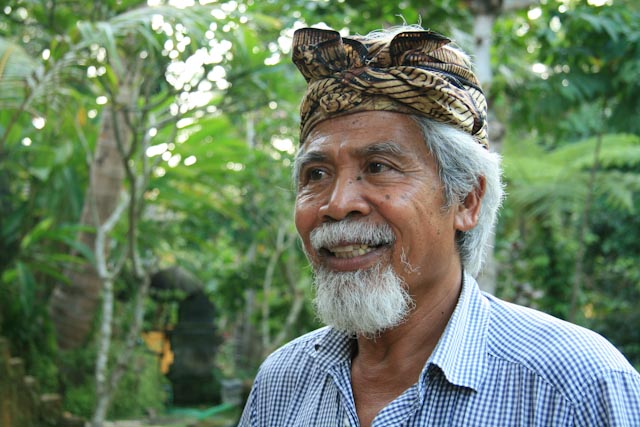
“I built my guest house on the town rubbish tip. It stank very bad!” says Nomad holding his nose.
In order to improve the garden Nomad began reading any book he could find on organic gardening.
The surrounding fields around his house are farmed for rice. Rice paddies and water flood the surrounding landscape. Farmers irrigate the field and toil under the hot sun to grow their four crops of rice per year. But their take home pay is very low. Many struggle to make ends meet.
“I am at heart a farmer.” says Nomad. “I want my community to become organic. I want Bali to become a true organic island.”
Nomad thought about what sort of crops he could grow to support the thriving tourist market in Bali.
“Every farmer at the moment in Bali is using chemicals.” he says. ” To kill the germs. The bio-diversity is gone. The soil is dead.”
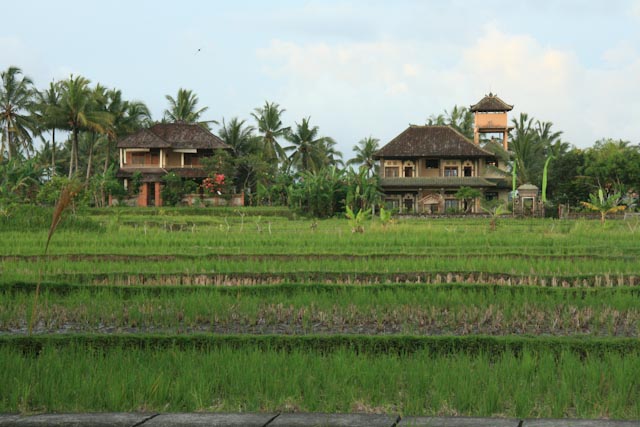
Nomad says the Indonesian government has invested heavily in chemical factories that produce large amounts of super-phosphates. These phosphates stimulate food production but at the cost of destroying important soil biota.
Its the soil biota that Nomad wants to rebuild.
Nomad believes organically grown food is more disease resistant and healthier for you. Nomad’s dream is to get the Bali to go completely organic But it can’t be done instantly.
Getting the local farmers to go organic is not easy. Many are sympathetic to the idea but lack the financial capital to spend a year converting their land to organic farmland. Its money they just don’t have. So the cycle continues in doing what they know best. Growing rice.
“Everybody talks about organic farming, but nobody would do anything about it.” says Nomad. The politicians wont do anything. Neither would the farmers.
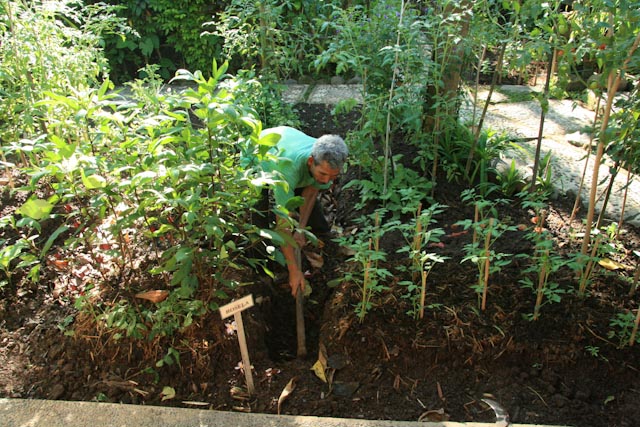
Nomad decided to lead by example. He would try it himself.
Next to his guest house he built an organic garden. Starting a small garden on an old rubbish tip wasn’t easy. The first thing he did was remove the grass and cut a compost trench next to the planted vegetables. His neighbours watched but said little.
The vegetable scraps from the restaurant were just bucketed into the trench and dug over to speed up the composting process.
Nomad says because of the tropical heat and moisture, fresh compost can be produced within two weeks. This garden is just two months old and the transformation is remarkable.

Where the first garden beds were made the soil is rich and dark with the crumbly texture of rich vitality that resembles worm castings. The newer garden beds are less dark. Nomad instructs his gardener to follow his organic principles to the letter. Seedlings are planted into small round compost balls that are planted directly into the new garden.
“My staff won’t ask me directly what I am doing.” says Nomad, “but I see them talking about it with the gardener when I am gone.”
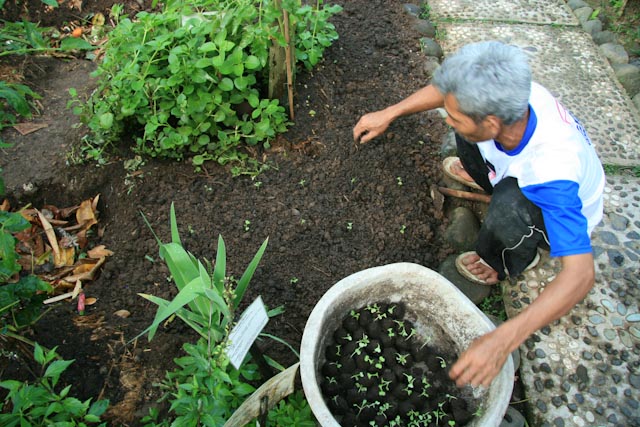
Nomads garden is now thriving with tomatoes, basil, beans, vanilla, rosemary, mint and many other medicinal herbs and spices.
Having seen the success of this small scale organic garden has inspired Nomad to now try his hand at a much larger scale operation.
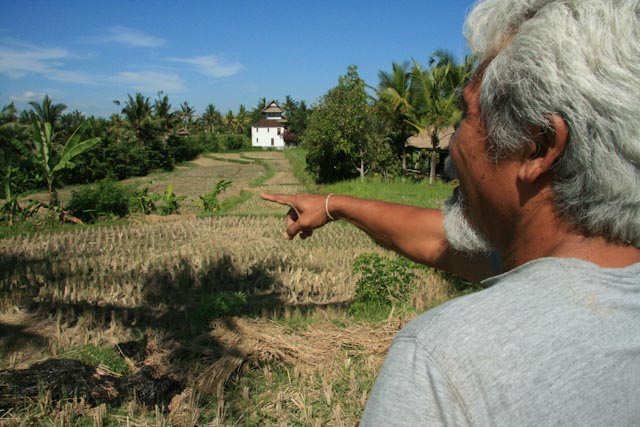
He recently purchased a couple of acres of land in an adjoining rice paddy field. He’s already developed a business plan on paper where every plant is scrutinised for how productive it can be.
A rice farmer at the moment earns a pittance per month when compared to what he could earn if he switched to growing organic vegetables.
Nomad estimates each farmer could earn around $200 per month if they switched their farm management strategies. This is a large sum of money in Bali.
“You can get so much more money than just growing rice.” say Nomad. “You can get 15,000 Rupiah ($2 Aust) per kilo for Organically grown tomatoes. More than double what you get for conventional chemically grown tomatoes and much, much more money than growing rice.”
Ubud does have an “organic” farmers market on Sunday and Wednesday but the problem is that most of the produce comes from other towns and often imported into Bali and of questionable “organic” origin.
‘I am a true Ubudian – if there is such a word.” he says. “I want my community to support itself with real organic food grown here in Ubud.”
But in order to do that, the farmers need to learn new strategies.
Nomad explains his philosophy as two main principles. “Solidarity with Compassion.”
“I want all farmers to copy me.” he says. His community comes first. But wouldn’t he become worried by competitive farmers growing similar produce to his own for sale?
“No!” says Nomad emphatically. “In my garden there is a sign that says, ‘No one ever grows poor helping someone else.'”
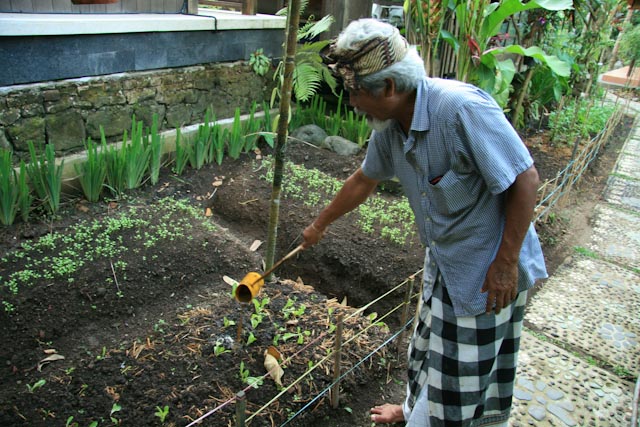
“In two months, I will be harvesting vegetables on my new land. True Organic vegetables and fruit for sale here in Ubud. In six months, the Balinese farmers will all be copying me!’
And where does Permaculture fit into all of this?
Nomad grins.
“Tell Geoff Lawton to come to Bali and teach a course here in Permaculture. I will be his number one student. I am always learning.” Says Nomad.
“I feel like a forty year old man. Soon my grey beard will turn black.”
“Most people believe when you grow older – over fifty that you go down hill. But I don’t believe this,” he laughs, “I grow stronger and younger everyday.”






Maybe what you said is not true. You must prove first that the vegetables are not organic. My farm is in Baturiti the best growing weather in Bali and most produce comes from that area. Most of the land near Ubud is full of chemicals. All my product is 100% organic. Pak Nomad, I think you had a big farm in Baturiti. It’s not true all farmers in Bali are using chemicals. I don’t use chemicals. Maybe 97% use chemicals. I don’t just talk about this. I work hard every day at my organic farm and I have a lot of customers that believe me.